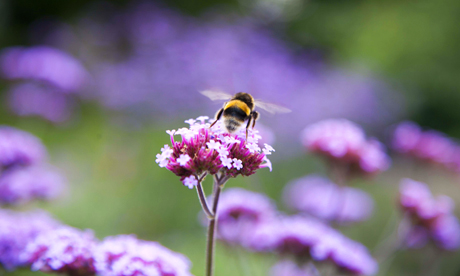Give bees a chance

Creating a buzz: Hackney Friends of the Earth. Photograph: Amelia Collins
By now we’re all aware of the importance of protecting bees.
Certainly governments have a role to play in banning substances that harm the insects, but you and I can also help provide a healthy environment for our miniature winged friends.
In recent years bee numbers have fallen considerably as we have been destroying their sources of food and nesting sites and poisoning them with chemicals. Though bees may not be as cuddly-looking as charismatic megafauna such as pandas, they play a crucial role in the food chains that keep us alive by pollinating three quarters of our crops and other food sources.
Without apian assistance, we would struggle to survive ourselves.
Friends of the Earth has named 2013 the ‘Year of the Bee’ and are sending people Bee Saver Kits as part of their ‘Bee Cause’ campaign.
According to the organisation, bees have lost 97 per cent of their natural grassland habitat in Britain over the past 60 years.
When you sign up for your kit at foe.co.uk you will be sent wildflower seeds together with information on how to help preserve the natural habitat of nature’s key workers.
There are 267 species of bees in Britain and quite a number of these have been spotted in Hackney. You might think city life would be hard on bees, but in fact the warmth generated by urban living makes for a longer growing season and hence greater opportunities for bees to source food. This goes some way toward explaining the explosion in urban bee-keeping.
Hackney and surrounding areas are a-buzz with initiatives to nurture bees. Sustainable Hackney and Hackney Marshes User Group have been experimenting with alternative bee-keeping methods in their apiary at the Edible Forest Garden in Hackney Marsh. Hackney City Farm also has an apiary and a summer honey harvest event. In addition, the farm runs bee-keeping courses, the next of which starts on 22 May.
If bee-keeping makes you nervous, the best way to save bees is to get planting. Indigenous plants such as wildflowers are favoured by bees, but so are many common garden flowers and herbs, especially those with single blossoms. Easy-to-grow flowers that are especially bee-friendly include forget-me-nots, honeysuckle, buddleia and sedums.
So grab a packet of seeds and set to work! You can start in your own garden, flower-box or on common land. Ideal spots for wildflowers are those that get a lot of direct sunlight and are not often disturbed. Somewhat counter-intuitively, you’ll want to find a spot for wildflowers that does not have particularly fertile soil.
Seeds can be purchased at local garden shops and hardware stores. If you are doing wildflowers, it’s best to select a mixture, as some will bloom soon after being planted, whereas others won’t come up till the following year. Spring and autumn are the best time to sow seeds.
You’ll need to work the ground a bit first, don’t plant too many seeds in once place, and avoid using chemicals on the plants. Alternatively, you can plant seeds in pots and containers and then transplant them into the ground once they have sprouted. You’ll then enjoy a tapestry of colour, and local bees will have found a new home.
Finally, for committed idlers, there is one super-easy way to help bees, and that is by buying (and savouring) locally-grown honey, such as you can find at Stoke Newington Farmers Market.
